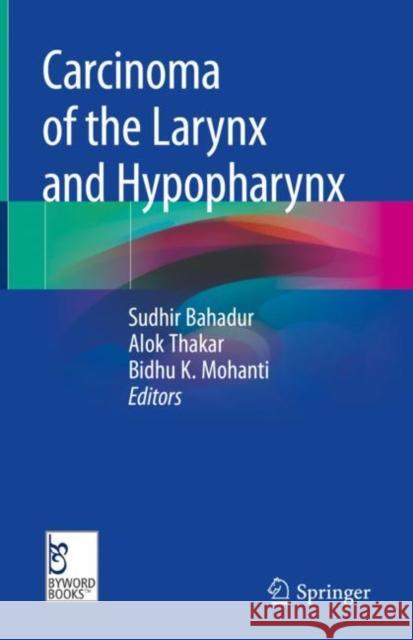Carcinoma of the Larynx and Hypopharynx » książka



Carcinoma of the Larynx and Hypopharynx
ISBN-13: 9789811331091 / Angielski / Twarda / 2019 / 226 str.
Carcinoma of the Larynx and Hypopharynx
ISBN-13: 9789811331091 / Angielski / Twarda / 2019 / 226 str.
(netto: 477,32 VAT: 5%)
Najniższa cena z 30 dni: 497,71 zł
ok. 20 dni roboczych.
Darmowa dostawa!
"This book is a brave attempt, by well-known and respected clinicians. The time and work involved in producing this volume, added to by the frustration of daily working, family life and publisher pressure, have produced a worthy product. Should this publication get to a second edition, the experience and lessons learned will allow for a more compact and informative work." (P J Bradley, The Journal of Laryngology & Otology, Vol. 133 (8), 2019)
Dr. Sudhir Bahadur, MS, FAMS, PhD is a highly experienced cancer surgeon, trained in all types of complex head and neck cancer surgeries. Dr. Bahadur has worked at the All India Institute of Medical Sciences, New Delhi as a faculty member for nearly 30 years. His areas of interest are head and neck surgery/oncology and surgery of the skull base. He is the past President of the Foundation of Head & Neck Oncology and Skull Base Society of India, and has published 200 research papers and textbook chapters. Dr Bahadur has received of numerous honours, including from the Foundation of Head & Neck Oncology, Association of Otolaryngology of India and ICMR, New Delhi.
Dr. Alok Thakar, MS, FRCS is a Professor of Otolaryngology and Head-Neck Surgery at the All India Institute of Medical Sciences, New Delhi. His clinical and research interests have been directed towards optimizing outcomes and minimizing the disability following treatment of Head-Neck and Skull Base Lesions. He has been instrumental in the development of trans-oral laser surgery, as well as voice conserving oncosurgery, minimally invasive skull base surgery, and techniques for rehabilitation of facial nerve and lower cranial nerve lesions. He has had a pioneering role in the introduction of trans-oral robotic surgery in the Indian subcontinent.
Professor Thakar has served in several prominent advisory positions including for the Taskforce on Head-Neck Cancer Management – Indian Council for Medical Research. He was a recipient of the Shakuntala Amir Chand National Award by the Indian Council of Medical Research, and has served as Hon. Secretary of the Foundation for Head-Neck Oncology. He has authored over 200 research publications and was recently appointed as Honorary Consultant to the Armed Forces Medical Services.
Dr. Bidhu K. Mohanti is an MBBS graduate from MKCG Medical College, Berhampur and has an MD in Radiotherapy from P.G.I.M.E.R., Chandigarh. He is currently a Consultant at Manipal Hospitals, Delhi. Dr. Mohanti has over 30 years of experience in oncology, covering academic, clinical and research responsibilities. He has worked as a radiation oncologist, and as faculty at Kidwai Memorial Institute of Oncology, Bangalore and AIIMS, New Delhi. He has also worked on an assignment for the Ministry of Health, Oman to establish the first radiotherapy department and set up patient care at the National Oncology Center, Royal Hospital, Muscat. He is a specialist in head and neck, GI and hepatobiliary, lung, pediatric cancers and hematologic malignancies, brachytherapy, palliative care and cancer survivorship. Dr. Mohanti has served as an expert for the IAEA, Vienna and European Commission. He has been a member of numerous professional societies and has received several awards, including the Life Time Achievement award from the Foundation for Head & Neck Oncology. He has published 165 peer-reviewed journal articles, international abstracts, book and chapters. He is the Editor of Text Book of Radiation Oncology: Principles and Practice (Elsevier) and has been invited to give many national and international presentations.
Carcinomas of the larynx and hypopharynx present unique challenges when it comes to their assessment and management. Management involves the essential dilemma of optimizing cure rates while also ensuring that potential disability due to compromised airway, voice and swallowing is minimized. Treatment decisions involve careful disease assessment, judicious multispecialty decision-making, and subsequent meticulous implementation of the selected treatment modalities.
The critical nature of each of these steps has led to dramatic advances in assessment techniques (radiology, endoscopy and photography, stroboscopy, narrow band imaging, contact endoscopy) and also in treatment methods (radiation therapy, combined concurrent chemo-radiation, combined sequential chemo-radiation, trans-oral CO2 laser and robotic surgery, partial laryngectomy, total laryngectomy, extended total laryngectomy). As such, treatment decisions have become increasingly complex with the twin objectives of maximizing cure as well as function preservation and are based on tumor stage, tumor location, systemic co-morbidities, nutritional status, patient priorities, and social and economic factors.
This multidisciplinary book has been written by a team of editors with considerable experience and expertise in these critical areas and a deep understanding of teamwork and the strengths and limitations of individual technologies and treatments. It presents a homogeneous and unbiased view that is applicable to all specialties involved in the care of larynx and hypopharynx cancers.
1997-2024 DolnySlask.com Agencja Internetowa
KrainaKsiazek.PL - Księgarnia Internetowa









